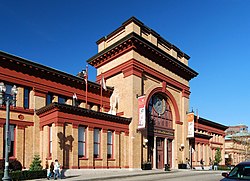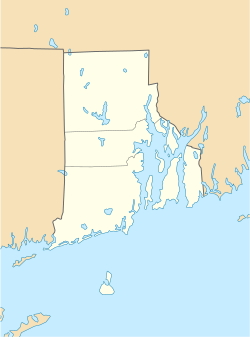Union Station describes two distinct, defunct train stations in Providence, Rhode Island. Parts of the latter one were renovated and the building contains offices and restaurants.
Union Station | |
 1898 Union Station | |
| Location | Providence, Rhode Island |
|---|---|
| Built | 1898 |
| Architect | Stone, Carpenter & Willson |
| Part of | Downtown Providence Historic District (ID84001967) |
| NRHP reference No. | 75000003[1] |
| Significant dates | |
| Added to NRHP | February 20, 1975 |
| Designated CP | February 10, 1984 |
Union Station (1847–1887)
editThe original Union Station was Providence's first, opening in 1848 to accommodate the needs of the newly thriving city. This building was designed by 21 year old Rhode Island architect, Thomas Alexander Tefft in the Lombard Romanesque style. Construction of the station was supervised by Tallman & Bucklin. Extending 720 feet along the edge of Exchange Place, the structure was the largest railroad station in the United States the time of its construction.[2] The building has also been dubbed longest building in the country at the time, though this assertion is disputed.[3][4]
In 1885, American Architect and Building News voted the building one of the 20 best buildings in the country.[3] 20th century architectural historian Henry-Russell Hitchcock wrote of the station, "without much question it was the finest early station in the New World."[5]
As the city continued to grow, so too did the need for terminal space, ultimately resulting in the paving over of the remnants of the city's inland bay in 1890. The question of what to do with the now undersized station was spontaneously answered on February 21, 1896 when the building suffered a catastrophic fire that effectively gutted the structure.[6]
-
A drawing of the first Union Station in 1857, ten years after its construction
-
City Hall and the first Union Station in 1885
-
An 1886 engraving of Exchange Place. The station is visible to the right of City Hall.
-
The building immediately following the 1896 fire.
Union Station (1898–1986)
editA much larger Union Station was opened in 1898, clad in distinctive yellow brick, which the Providence Journal heralded as "a new era of history of this city".[7] The station was designed by the firm of Stone, Carpenter & Willson, which had also designed other Providence buildings.[8] Though rail use was expected to grow, by the 1980s rail traffic had dropped 75 percent. City planners saw the opportunity to dismantle the "Chinese Wall" of train tracks that hemmed in Providence's central business district and moved MBTA and Amtrak service to a new, smaller Providence station about a half mile north in 1986.[9]
-
This c. 1910 postcard shows the second Union Station
-
South elevation of the station in 1982
-
The interior of the station in 1982
-
View over Kennedy Plaza. The old Union Station buildings are visible in the foreground.
Redevelopment (1987–Present)
editUnion Station caught fire in April 1987[10] amidst $11 million in renovations, forcing a change of plans. Parts of the original station have now been renovated and the building contains offices and restaurants, including the Union Station Brewery.
The center-most building of Union Station now houses the Rhode Island Foundation, which leases space to The Public's Radio, RI Kids Count,[11] and Women's Fund RI.[12]
Track 15 food hall
editA $23.5-million investment to develop Rhode Island's first food hall in the station was begun in 2022,[13] by a local developer who purchased the building from The Rhode Island Foundation.[14] The 18,000-square-foot food hall will be named Track 15, a reference to the fact that the historic Union Station had 14 tracks.[14] The space will include a large central bar, a 10,000-square-foot outdoor event space, an entertainment space, and seating for "more than 300."[14] A tentative opening of "late summer 2024" was announced, with a variety of local food vendors including seafood, burgers, craft beers, and Italian and Mexican cuisine.[14]
References
edit- ^ "National Register Information System". National Register of Historic Places. National Park Service. January 23, 2007.
- ^ Anger, Jenny. "The Rise of the Professional Architect". Thomas Alexander Tefft: American Architecture in Transition, 1845-1860. Ed. Kathleen A. Curran. Providence, RI: Brown University, 1988.
- ^ a b Brussat, David (August 28, 2017). Lost Providence. Arcadia Publishing. ISBN 978-1-4671-3724-9.
- ^ Heppner, Frank (February 27, 2012). Railroads of Rhode Island: Shaping the Ocean State's Railways. Arcadia Publishing. ISBN 978-1-61423-363-3.
- ^ Hitchcock, Henry-Russell (1987). Architecture: Nineteenth and Twentieth Centuries. Yale University Press. ISBN 978-0-300-05320-3.
- ^ Societies (U.S.), Association of Engineering (1909). Journal of the Association of Engineering Societies.
- ^ Woodward, William McKenzie (2003). PPS/AIAri Guide to Providence Architecture. Providence, RI: Providence Preservation Society. pp. 303–304. ISBN 0-9742847-0-X.
- ^ "RISD : Rhode Island School of Design : MUSEUM HISTORY". Archived from the original on May 6, 2008. Retrieved April 13, 2007.
- ^ Woodward, William McKenzie (2003). PPS/AIAri Guide to Providence Architecture. Providence, RI: Providence Preservation Society. p. 13. ISBN 0-9742847-0-X.
- ^ "Providence Journal Article" (PDF). Archived from the original (PDF) on March 3, 2016. Retrieved July 15, 2011.
- ^ "Rhode Island KIDS COUNT > Home". Retrieved April 27, 2016.
- ^ "Women's Fund of Rhode Island". Retrieved April 27, 2016.
- ^ Doiron, Sarah (April 20, 2022). "RI's first food hall coming to Union Station". WPRI-TV. Retrieved April 23, 2022.
- ^ a b c d Ciampa, Gail (November 8, 2023). "Providence's first food hall has a name, merchants and an opening date. What to expect". Providence, RI: The Providence Journal. Retrieved November 8, 2023.
External links
edit- Union Station | Art In Ruins
- One Union Station History at the Wayback Machine (archived August 26, 2013)
- Historic American Buildings Survey (HABS) No. RI-388, "Providence Union Station, Exchange Terrace, Providence, Providence County, RI", 23 photos, 4 data pages, 1 photo caption page
- Historic American Engineering Record (HAER) No. RI-23, "Promenade Street Interlocking Tower, Promenade Street between Union Station & East Side Tunnel Viaduct", 6 photos, 3 data pages, 1 photo caption page

